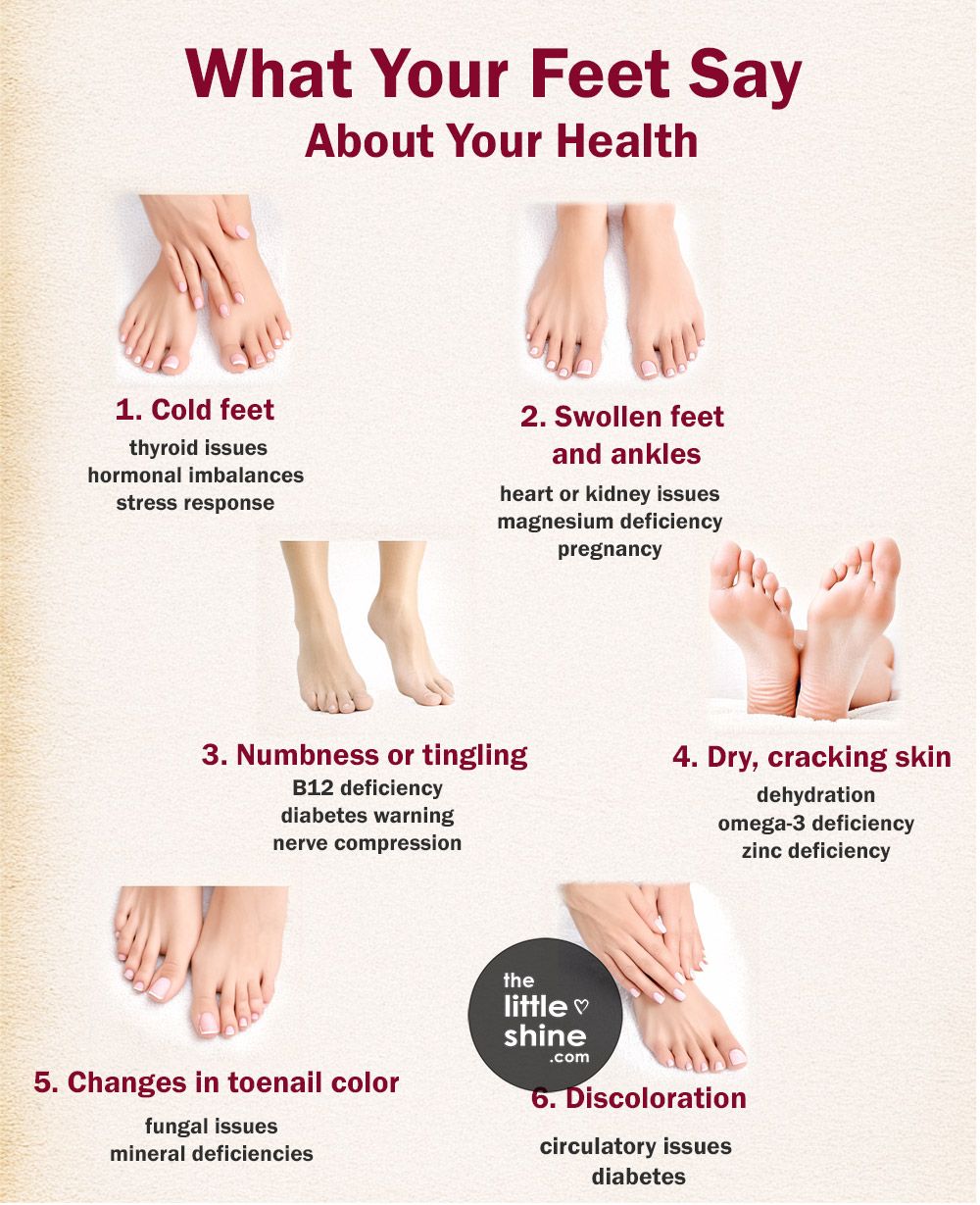Do you sometimes find your feet are unusually cold or swollen up? Maybe your feet feel numb? Do you have foot discoloration?

Well, out feet can speak a lot about our health without us evening knowing it. Cold feet could mean you’ve got thyroid issues, kidney and heart issues can lead to swollen feet, a vitamin B12 deficiency can lead to feet numbness and the list goes on.
So, in this article, you can learn all about what your feet say about your health and this way, as soon as you start seeing any of these symptoms, you can get yourself treated before it gets worse or leads to other problems.
What Your Feet Say About Your Health
1. Cold Feet
Signs of:
Thyroid issues – A condition called hypothyroidism, wherein the thyroid gland is underactive and it can slow down body metabolism
Diabetes – If you have high blood sugar, you may have poor blood circulation, leading to cold feet
Anaemia – Low levels of red blood cells in the body causes low blood circulation and cold feet
Nutritional deficiencies – Lack of vitamin B12, affects blood circulation and leads to fluctuations in body temperature
Atherosclerosis – A diseases where fatty plaque builds up in the arteries and this restricts blood flow to the extremities
2. Swollen Feet and Ankles
Signs of:
Edema (fluid buildup) – excess fluid in body tissues
Heart issues – When the heart doesn’t pump sufficient blood, blood can pool in the feet and ankles
Liver issues – Improper functioning of the liver, leading to excess fluid buildup in the feet and ankles
Infections – Like bacterial infections causing inflammation in the feet
Kidney disease – When the kidneys don’t filter the body properly thereby causing the swelling
Magnesium deficiency – Cause of water retention and swelling
3. Numbness or Tingling
Signs of –
Numbness and feet tingling can be signs of vitamin B12 deficiency, diabetes, nerve compression, alcohol abuse, exposure to toxins, damaged nerves (peripheral neuropathy) etc.
Other signs include –
Foot injury – If your foot has experienced any sort of trauma from an injury that could have damaged a nerve, foot numbness is often common
Diabetes – If your blood sugar levels aren’t under control, it can cause foot tingling
4. Dry and Cracked Skin
Signs of –
Dehydration, omega 3 deficiency, zinc deficiency etc., can be signs of dry and cracked skin of the feet.
Other signs include –
Exposure to hot water for long hours – Which strips away all the body’s natural oils
Standing for long periods of time – Leading to cracked heels
Skin conditions – Like eczema, psoriasis etc., can cause skin dryness and cracking
5. Toenail Discoloration
Signs of –
Fungal infections – Wherein the toenail can appear yellow, white or brown, in addition to thickening and crumbling of the nail
Mineral deficiencies – Most often if the minerals zinc or iron are less in the body, it can be a cause of toenail discoloration
Bruises – If you have stabbed your toe somewhere, it can lead to a bruise that has caused the toenail to get discoloured
Blood clots – If you’ve wounded your toe, a blood clot can make your nail appear black or dark purple
Sometimes, certain medications or an underlying health issue too can be a cause of toenail discoloration.
6. Foot Discoloration
Signs of –
Circulatory issues – If you have poor blood circulation, you could develop conditions like peripheral artery disease (PAD) or chronic venous insufficiency (CVI), causing the foot skin to get discoloured (bluish or brownish in hue)
Diabetes – If your feet get swollen and you find red, blue, grey or white coloured changes in your skin, it could be a sign of diabetes
Skin conditions – Like stasis dermatitis can cause foot discoloration
Injury – If you’ve injured your foot, temporary foot discoloration is quite normal
